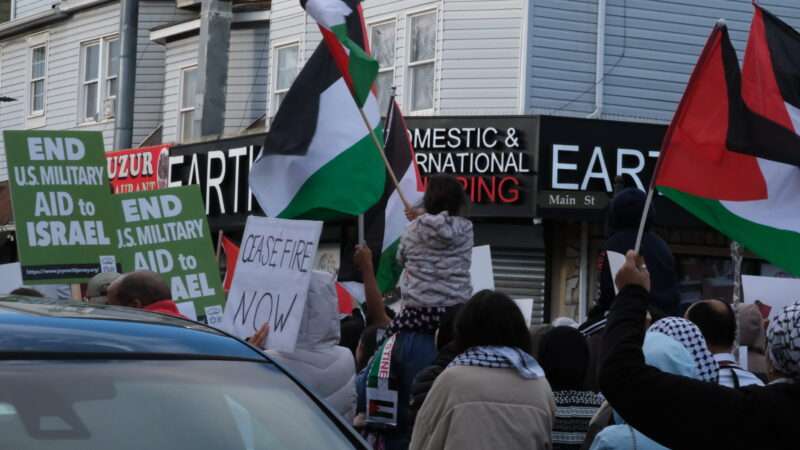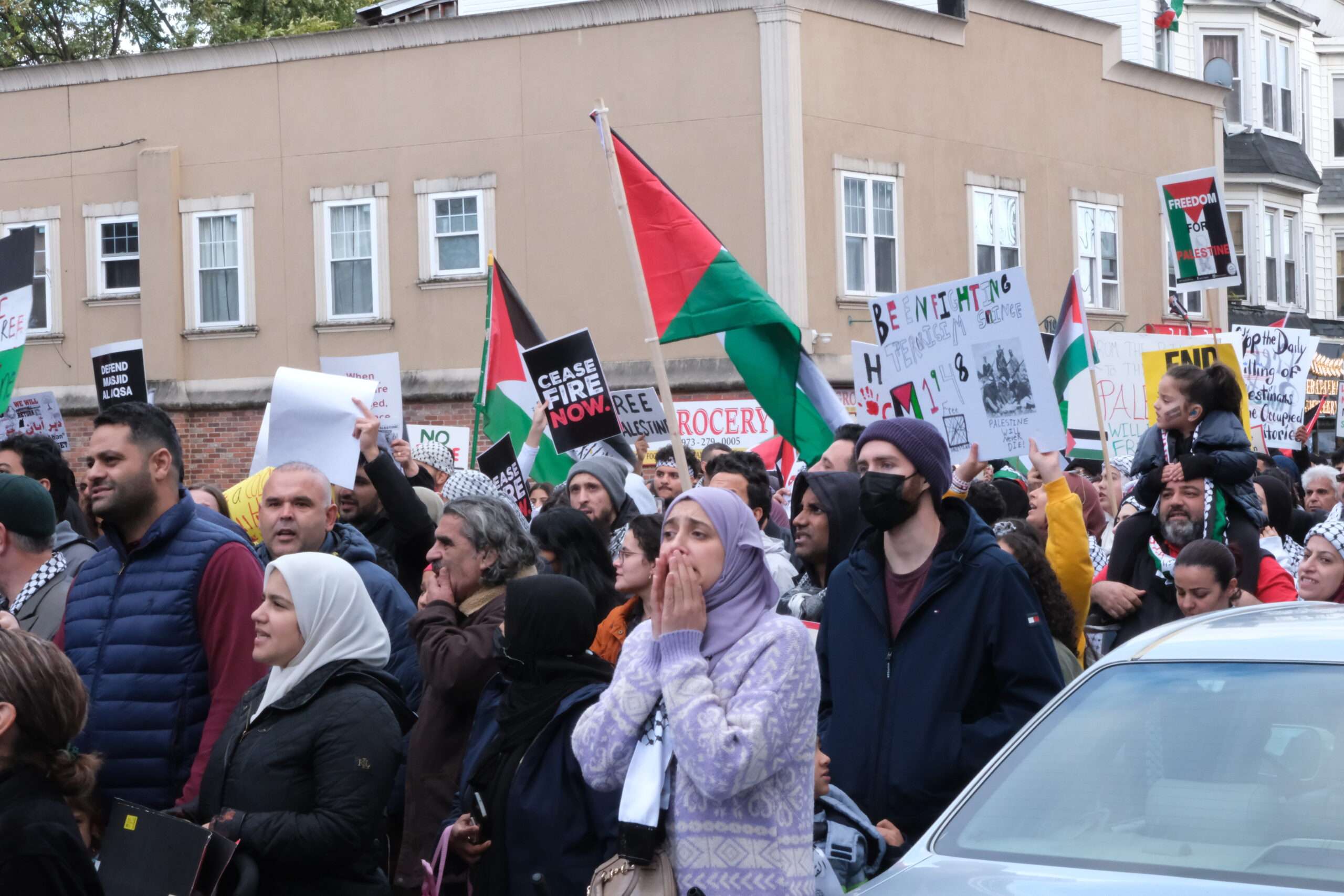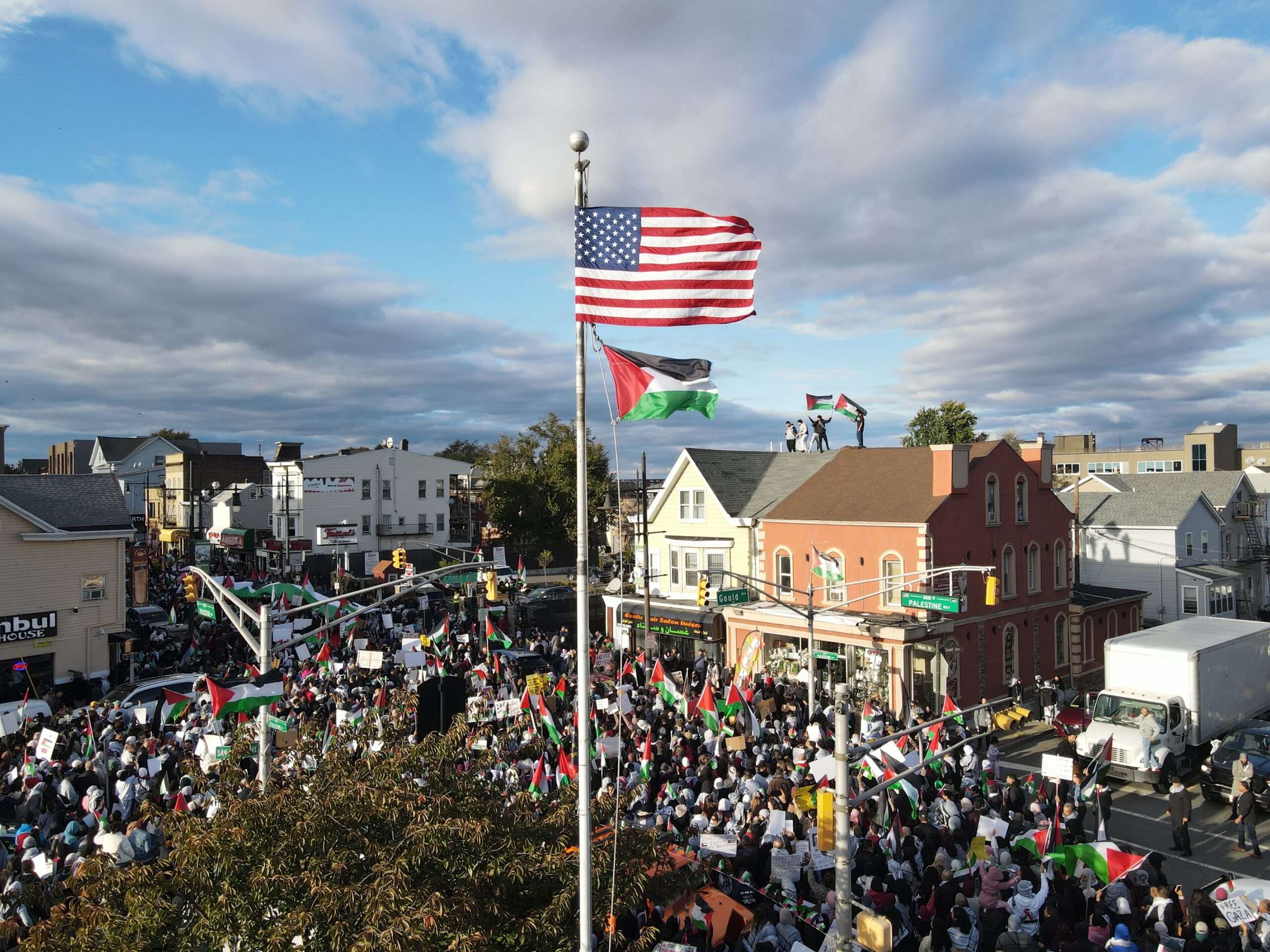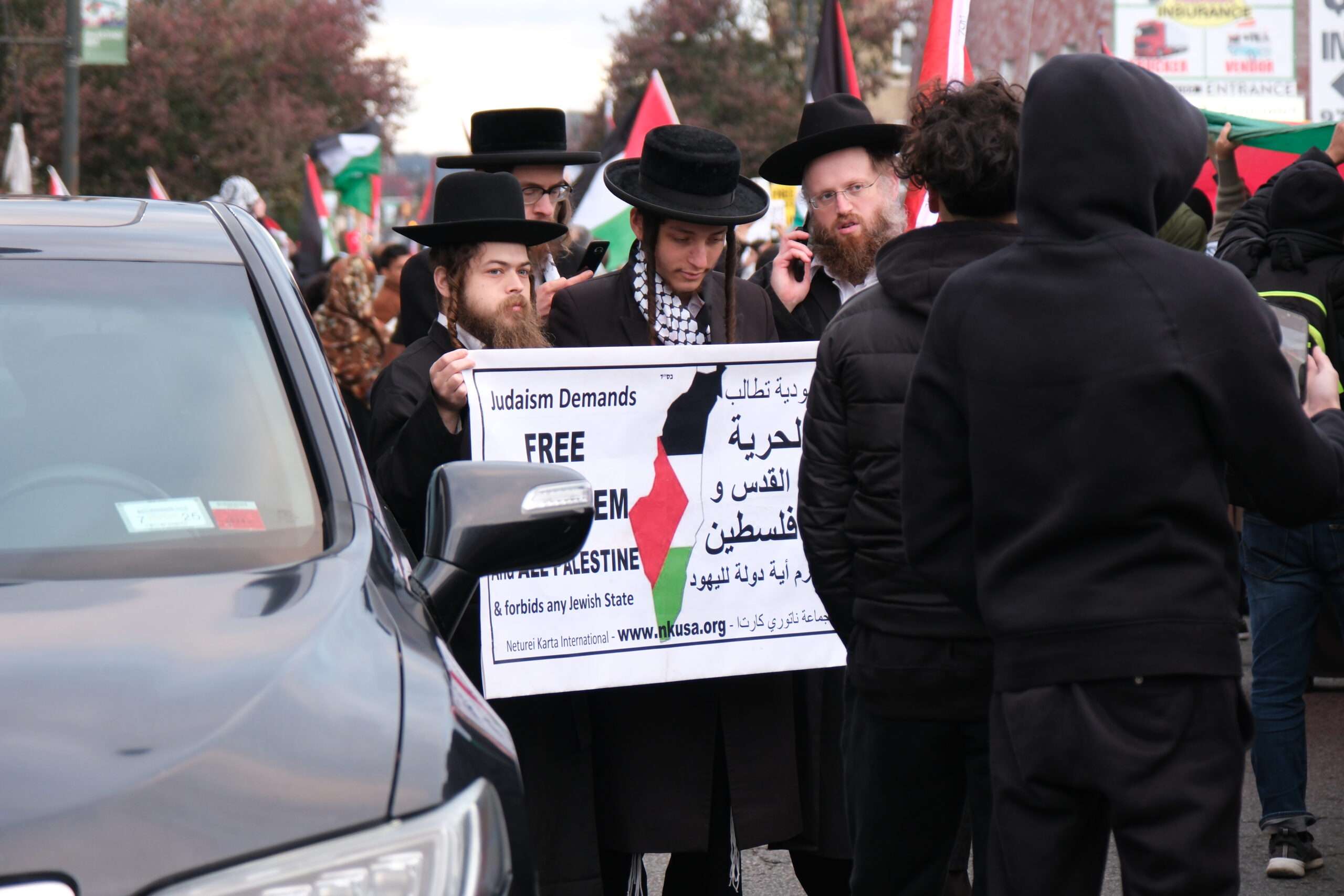
Paterson is a proudly American, proudly Arab town. Founded around New Jersey's Great Falls by Alexander Hamilton in 1792, it was America's first planned industrial zone. Waves of immigrants built Paterson into a real city, starting with Italian and Arab silk weavers in the 19th century. The classic brick buildings, some of them featured in The Sopranos, host businesses like Fattal's Syrian Bakery and George's Middle-East Grocery.
Today, Paterson is in mourning. The war in Gaza has hit close to home. Mohammad Qatanani, the imam of the local mosque, says he lost 15 family members to an Israeli air raid. Several other New Jersey residents are among the hundreds of Americans who were visiting Gaza when the war trapped them there. Palestinian Americans and their supporters have held several rallies in Paterson and nearby New York City.
The Palestinian group Hamas launched its deadliest-ever attack against Israelis on October 7, massacring around 1,400 people, and the Israeli military has retaliated with an air campaign in Gaza, which has killed over 7,000 people so far. The war has stoked anti-Palestinian feelings in the United States. Republicans have used rumors about "pro-Hamas" rallies—real or imagined—to call for a ban on Palestinian immigration and the deportation of "pro-Hamas" immigrants.
But the Arab-American community has been here long before the current war. Some, like the Syrian silk weavers of Paterson, came to America before the state of Israel even existed. Others fled the wars of the 1940s or the 1960s, decades before Hamas was founded.
For many Arab Americans, and especially Palestinian Americans, the violence in Gaza is a reminder of why they came to America in the first place. At an October 22 rally, Palestinian American Community Center Education Director Basma Bsharat emphasized that Paterson was filled with "the sons of daughters of refugees" who have faced "decades of displacement." She said that she considers "every other Palestinian our family."
The "Emergency Rally for Gaza" was a cross-section of local life in Paterson. Restaurants and convenience stores put up Palestinian flags to show their support for the cause. Teenage boys and girls showed off, posing for pictures in cars decked out with the symbols of Palestine or other Arab nations. They were joined by several non-Arab city councilmen in matching suits and lapel pins.

"Our Palestine community is suffering. They're mourning," Councilman Luis Velez, who was born in Puerto Rico, said on the sidelines of the protest. "We all want peace in the Middle East. We want peace in Israel. We want peace also in Palestine."
The rally was held along Palestine Way, a thoroughfare that was renamed in honor of the Palestinian community in 2022. Local activists gave speeches at a park maintained by the Deir Jarir Association, a volunteer group founded by natives of the Palestinian town of Deir Jarir. One of the police officers doing crowd control wore a keffiyeh, a scarf in the traditional Palestinian checkerboard pattern. An African-American couple set up a stand selling Palestinian scarves and T-shirts.
Speakers at the rally made a few specific demands. They wanted the United States to cut military aid to Israel, pressure the two sides to accept a ceasefire, and ensure that humanitarian aid entering Gaza would be protected. Bsharat mentioned the local and state politicians who have made pro-ceasefire statements.

While President Joe Biden has urged Israel to respect the laws of war, his administration has requested $14.3 billion in additional military aid for Israel and sent two aircraft carriers to the region as a threat to Israel's rivals. U.S. Secretary of State Antony Blinken has rejected the idea of a ceasefire, arguing that it will only allow Hamas to continue threatening Israel, although he is open to the idea of "humanitarian pauses" in the bombing.
"We are very proud to be American, but we are not proud to swallow the lies of Mr. Biden and Mr. Blinken," said Qatanani, the imam, in his speech. He also denounced "Arabic governments and Muslim countries" for their failure to "stand for justice."
American political figures have used the tensions between Palestinians and other Arab nations to stoke anti-Palestinian sentiment. After Jordan and Egypt declared that they would not support a mass Palestinian exodus, Fox News host Jesse Watters argued that "we all know why they don't want the Palestinians."
"The Palestinians hire Hamas to run their government. You poll them. They all love killing Jews," Watters said. "Every time a Palestinian refugee goes to another country, it doesn't work out so well for the country and for those Palestinians."
Florida Gov. Ron DeSantis, who is attempting to ban pro-Palestinian student groups from Florida universities, has also claimed that Palestinians from Gaza are "all antisemitic."
Qatanani offers what he sees as a different message: "I want to say for our Jewish friends, you are welcome" in Paterson's mosque, the imam said, pausing as cheers erupted from the crowd. "You are welcome, and you are with us. We believe that we do not have any problem with Jews."
A fundamentalist Jewish group known as Neturei Karta marched at the front of the protest, wearing Palestinian symbols. Neturei Karta believes that the state of Israel violates Jewish law and that all the land should be put under Palestinian rule. This position is considered fringe in the Jewish community but has allowed Neturei Karta to build close ties to Palestinian activists.

The rally was also an opportunity for Paterson residents to share their personal history with the conflict. "The war started not just last week. It started a long time ago," said protester Tareq Yousef, whose family was displaced from Jerusalem during Israel's 1948 independence war and came to America in the wake of the Six-Day War of 1967. "We've been kicked out of our country many times."
Attallah Amash is another one of the Palestinian Americans who lost his home in the 1948 war. He had the misfortune of being born in Ramla, which sat along the road from Tel Aviv to Jerusalem and next to the main British air base in the region. In July 1948, when Attallah was only eight years old, Israeli troops besieged Ramla and its twin city Lydda as part of their independence struggle.
The new state of Israel "obliterated the city of Lydda" in "forty-eight hours of hell," Israeli journalist Ari Shavit later wrote of the battle. Fearing local resistance, Israeli forces had fired into Lydda's streets, houses, and mosques. Israeli and Palestinian historians dispute exactly how many civilians were killed, but when the dust cleared, Israeli leaders ordered the troops to round up and expel around 70,000 citizens from Lydda and Ramla for good. Attallah was one of them.
Now a refugee, Attallah had to make a living selling coffee and tea on the streets. An American pastor named Ralph Wagoner eventually took the Amash family, who were Christian, under his wing. With Wagoner's sponsorship, Attallah was resettled in Michigan in 1956 and married a Syrian-American woman named Mimi. Their son Justin Amash served Michigan as a Republican congressman from 2011 to 2019, as an independent from 2019 to 2020, and as a Libertarian from 2020 to 2021.
Another branch of the Amash family stayed in Gaza, then under Egyptian control. Gaza City was conquered by Israel in 1967 and taken over by Hamas in 2006. During the latest round of fighting, Yara and Viola Amash took shelter in the ancient St. Porphyrius Church. Israeli warplanes bombed the area—targeting a nearby Hamas "command center," according to the Israeli military—and killed the two Amash girls.
"The Palestinian Christian community has endured so much. Our family is hurting badly," the former congressman wrote in an announcement of his cousins' deaths. "May God watch over all Christians in Gaza—and all Israelis and Palestinians who are suffering, whatever their religion or creed."
Palestinian Americans now worry about the violence making its way to American soil. Paterson's Palestinian American Community Center hosted a press conference on October 16 to address the ongoing war. Bsharat, the education director, warned of "harassment and hate crimes on both a local and national level." She said that the community center received threatening phone calls and had to hire extra security.
The killing of Wadea Al Fayoume weighed particularly heavily on the community. The 6-year-old Al Fayoume was stabbed by his landlord, who allegedly shouted about the conflict before attacking the child. At the press conference, Bsharat wondered aloud whether her own son could have been a victim of a similar crime.
Yousef, the man from Jerusalem, emphasized that Americans are mostly "nice people," though many are misinformed about the conflict.
"Americans must know that all the Palestinians just want to go and have peace. They love life," he said. Yousef motioned to the Arabic signs on stores along Palestine Way: "Look around you. We built this stuff."
The post Palestinian Americans Are Americans, Too appeared first on Reason.com.







